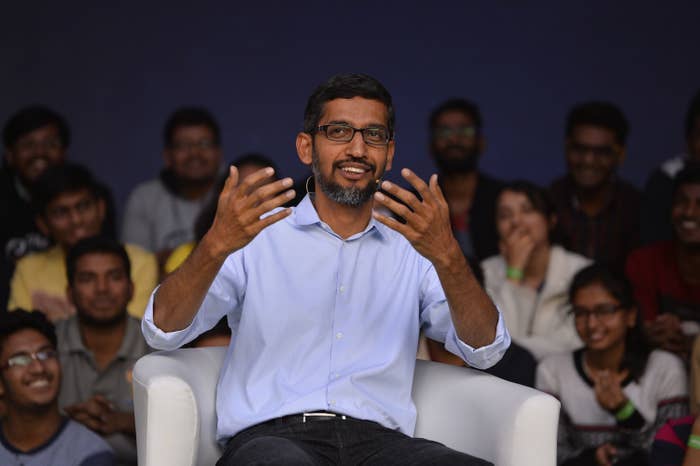
Dozens of prominent startups in India, one of the world’s largest internet markets, are creating a coalition to fight a Google decision that would require them to give 30% of in-app payments to the tech giant beginning next year.
On Tuesday, nearly 60 executives from dozens of Indian companies kicked off preliminary discussions, three people familiar with the talks told BuzzFeed News.
The coalition, which will include multibillion-dollar companies like payments giant Paytm, online ticketing firm MakeMyTrip, and local social networks like ShareChat among others, wants to fight Silicon Valley's increasing influence on the Indian internet, lobby the Indian government on behalf of homegrown startups, and set up an Indian app store as an alternative way to the Google Play store.
Last month after Google pulled Paytm, a payment app used by more than 350 million people and India’s highest-valued startup at over $16 billion, from the Play store, its billionaire founder and CEO Vijay Shekhar Sharma expressed displeasure about an American company controlling access to customers in India. “No foreign company should control the destiny of Indian startups,” he said in an interview.
Sharma did not respond to a request for comment from BuzzFeed News.
The move spooked Indian startups and raised questions about how much control Google had over the country’s internet.
Around the world, developers have pushed back against Apple and Google, accusing them of using their monopolies over the App Store and the Google Play store to collect unreasonable commissions.
Last week, Epic Games, the maker of Fortnite, which both Apple and Google recently kicked off their platforms for bypassing the companies’ payment systems, Spotify, the Match Group, which owns Tinder, and others, launched a nonprofit called the Coalition for App Fairness to push the companies to change their app store policies.
The Indian coalition doesn’t have a name yet and discussions are still in the early stages, according to people with knowledge of the matter, but the spirit is the same. “The form and structure of this coalition is yet to be determined,” Vishal Gondal, founder and CEO of GOQii, a health and fitness startup that plans to be part of the coalition, told BuzzFeed News. “But clearly Google has invited this on itself.”
“But I’d hate to see a Big Tech monopoly replaced with a Big State monopoly.”
A Google spokesperson declined to comment.
Unlike the US, where Google’s Android and Apple’s iOS operating systems have roughly equal market share, 99% of smartphones sold in India are powered by Android, according to data by market research agency Counterpoint.
“That’s the whole problem,” said Gondal. Unlike Apple, Google offers a variety of ways to download apps, including letting anyone offer their own app stores on Android. But most people use the Google Play store to download apps because it’s built into their phones.
“There’s essentially no way around the Play store in India,” Snehil Khanor, CEO of TrulyMadly, an Indian dating app that also plans to sign up for the coalition, told BuzzFeed News. “It’s hard to distribute apps outside it.”
More than 500 million Indians have come online over the last few years thanks to inexpensive smartphones and plunging data prices. The explosion of new users has made the country a key growth market for most large Silicon Valley tech companies and birthed a robust startup ecosystem. In 2019, tech startups in India raised $14.5 billion, and in just the last six months, Google and Facebook pumped over $10 billion into the country.
Almost all of India’s internet revolution is powered by Android, which has put Google under government scrutiny. The company is under multiple ongoing antitrust investigations by Indian regulators concerned that it has used its dominance to crush competition and boost its own products and services.
Although the group has not yet put forward any plans, critics say that the only way an alternative store would be successful would be with state backing.
“Hypothetically, it would work if you passed legislation saying that all Android phones sold in India should have this Indian app store built-in,” Aman Nair, policy officer at the Center for Internet and Society, a Bangalore-based technology think tank, told BuzzFeed News.
“But I’d hate to see a Big Tech monopoly replaced with a Big State monopoly.”

